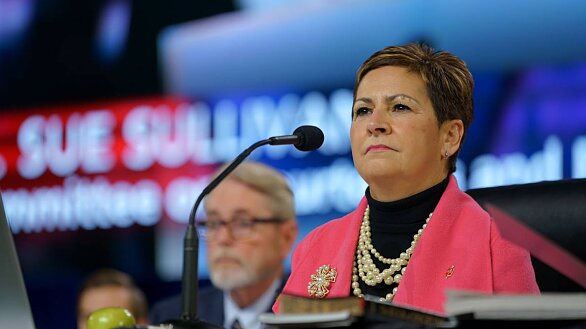Don’t go back to normal, says Bishop Cynthia Harvey
In the fifth UM National Day of Prayer, sponsored by UM Men of the South Central Jurisdiction, Louisiana Area Bishop Cynthia Harvey noted the presence of multi-faceted pandemics, saying, “Nothing in front of us looks like anything in our rearview mirror.”
While many look forward to a return to “normal,” the bishop, who serves as president of the Council of Bishop, said she does not want to return to a place with consistent racism and divisions in the church and society.
She told participants in the August 23 Zoom call, “I pray we don’t go back to normal.”
She suggests the virus and social distancing “have given us time to refocus.”
“The world is pretty dark right now,” said the bishop. “We can bring the light [and] prepare the way for a better tomorrow.”
In an inclusive litany, the bishop offered prayers on behalf of
- Health care workers
- Researchers seeking a vaccine
- The homeless
- Parents who are balancing work and teaching their children
- A divided nation
- People who have died because of the color of their skin
- Those who seek justice
- The undocumented
- Those who think they have it all together and really don’t
- Those who face two hurricanes.
A fearful beginning
The Rev. Dr. Joe Harris, assistant to the Oklahoma Area Bishop and former top staff executive of the General Commission on UM Men, told participants about a black clergyman who had been appointed as a district superintendent some years ago.
The district parsonage was located in Little Dixie, Okla. The town had “sunset laws” which prohibited people of color from being on the street after sunset, and one week earlier, the Klan had passed through the community.
The pastor was fearful about moving into such a community, and the night after his move, he and his family expected to see a cross burning on their front lawn.
That didn’t happen, and that clergyman went on to serve the district for eight years.
“I was that person,” said Dr. Harris.
Emphasizing what one person can do in the face of racism, Dr. Harris said he later learned that one individual had stood up and warned the Klan and other racist not to do anything against the new superintendent.
Observing that many people are experiencing fatigue in addressing racism, Harris said the absence of effort “leads to backlash.”
“This is not a black issue,” said Harris. “This is a Kingdom issue. . . Help us to see ourselves as incarnational missionaries.”
Toxic individualism
The Rev. Kennetha Bigham-Tsai, top staff executive of the UM Connectional Table, urged conference participants to address an additional pandemic: “A toxic individualism that denies mutuality and compassion.”
“I can’t be what I ought to be until you are what you ought to be,” she said. She said our self-focus too often makes us think of the 175,000 people who have died of COVID-19 as simple statistics rather than as members of grieving families; this individualism fails to recognize that the losses disproportionately affect people of color.
“Compassion” derives from two Greek word ‘com’ meaning ‘with’ and ‘pati’ meaning suffer. “To have compassion means to suffer with.”
If you are suffering, I am suffering.
“I’m not ok unless you are ok.”
Other prayer warriors
- Great Plains Area Bishop Rueben Saenz, Jr., called participants to really hear and try to understand what people on the opposite side of any issue are saying and to work for peace with justice.
- Arkansas Area Bishop Gary Mueller encouraged men to make the Lord’s Prayer a daily prayer, not simply a routine prayer recited during worship services. The vice-president of the General Commission on UM Men said Jesus did not ask his disciples to repeat the words, he urged them to pray “like” this. He said prayer allows us to “go, live, and do.”
- San Antonio Area Bishop Robert Schnase talked about prevenient, justifying and sanctifying grace. “Grace is out native language,” he said. He said that while grace can give us comfort it can also take us to places we do not want to go.
- Houston Area Bishop Scott Jones told participants how Solomon asked God for wisdom. He said they should do the same in order to see how they can be of service during this unsettled time. Recalling how Methodist Hospital was established during the Spanish Flu, leaders of UM Men should seek God’s wisdom to see how they can be of service during this pandemic.
Mark Lubbock, a Louisiana-based staff member of the General Commission on UM Men, served as host of the 3-hour event.
Other speakers included: Gil Hanke, top executive of the commission; the Rev. Dr. Rick Vance, director of the Center for Men’s Ministries; Joe Kelley, president of the South Central Jurisdiction United Methodist Men; Migdiel Perez manager, Upper Room Prayer Center; George Houle, president of Great Plains UM Men; and the Rev. Sylvester E. Chase, Jr., Wesley UMC, Austin, Texas.
A link to all five National Days of Prayer is located here.


